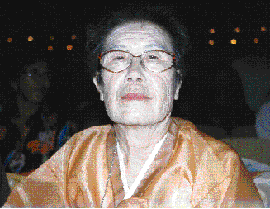WITNESS UNBOWED
Chung Seo Woon suffered the cruelest fate men can inflict on women, and
kept the courage to tell her story to the whole world.
by Dai Sil Kim-Gibson
Page 1 of 5
Reprinted by permission of Dai Sil Kim-Gibson
This article first appeared in
Making More Waves
 he term "comfort women" is a euphemism for women who were forced to
serve as sexual slaves for Japanese soldiers under the pretext that they were
joining Jungshindae, literally, "Voluntary Committee Body Corps," a
Japanese-coined term meaning devoting one's entire being to the cause of the
emperor. The more precise term is Jungun Wianbu (military comfort
women) in Korean and Jungunianfu in Japanese. Because the term
itself is an indication of the complexity of this issue, I use it advisedly.
he term "comfort women" is a euphemism for women who were forced to
serve as sexual slaves for Japanese soldiers under the pretext that they were
joining Jungshindae, literally, "Voluntary Committee Body Corps," a
Japanese-coined term meaning devoting one's entire being to the cause of the
emperor. The more precise term is Jungun Wianbu (military comfort
women) in Korean and Jungunianfu in Japanese. Because the term
itself is an indication of the complexity of this issue, I use it advisedly.
| "Toward the end of the war, schools were pressured to identify and provide girls." |

Comfort women were only a fraction of the human resources Japan appropriated from Korea. Expansion of the war caused a severe domestic labor shortage, a predicament the Imperial government sought to solve by mobilizing "peninsula people" (Koreans). Since 1920, Japan sought to complete Japanization and annihilation of Korean culture and history. The concentrated wartime draft of Korean men and women was consistent with Japanese colonial policy. Comfort women were recruited under the pretext of "work" opportunities or simply coerced. Korean villages were raided to seize women. Toward the end of the war, schools were pressured to identify and provide girls.
Until recently, the issue has been confined to buried memories of a shamed past. Even since it became public, the investigation had met numerous obstacles, including Japan's initial denials and refusal to disclose relevant documents. Bit by bit, like nightmares unraveling, some facts were uncovered and Japan was forced to deal with it. According to the Washington Post (February 7, 1996), a key United Nations investigator, Radhika Coomaraswamy, in her report for the fifty-three-nation U.N. Human Rights Commission, recommended that in addition to apologies and compensation, Japan must identify and punish those responsible for this crime. However, Japan still denies its legal responsibility and refuses to disclose all the facts. PAGE 2
CONTACT US
|
ADVERTISING INFO
© 1996-2013 Asian Media Group Inc
No part of the contents of this site may be reproduced without prior written permission.
